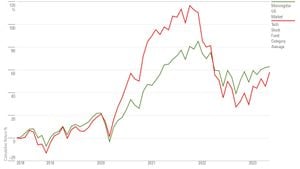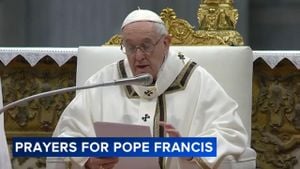Germany's 2025 Federal Election has ushered in significant political changes, with the center-right Christian Democratic Union/Christian Social Union (CDU/CSU) securing victory under the leadership of Friedrich Merz. The elections, held on February 23, confirmed the CDU/CSU's rise with approximately 28.5% of the votes, marking their return to power after several years of coalition governance.
Emerging as the second-largest party, the far-right Alternative for Germany (AfD) achieved unprecedented gains, garnering 20.8% of the vote. This marks the highest representation for the far-right since World War II, illustrating a notable shift among voters toward more nationalist policies. The Social Democratic Party (SPD), led by outgoing Chancellor Olaf Scholz, suffered significant losses, coming in third with 16.4%—the party's worst performance since 1887.
Celebrations erupted at CDU headquarters as exit polls forecasted their victory, and Merz, who is poised to become Chancellor, declared, "Let’s get the party started," signaling the intent to quickly initiate coalition talks. His victory speech also acknowledged the need for unity among conservative voters, emphasizing the CDU/CSU's focus on pressing immigration and economic concerns.
The elections come against the backdrop of increasing anxiety concerning immigration policies and the geopolitical climate influenced by former U.S. President Donald Trump. Merz highlighted this tension, stating, "After Donald Trump’s remarks last week... it is clear this government does not care much about the fate of Europe," during his appearance on German broadcaster ARD. His staunch conservative stance includes advocacy for sending military aid to Ukraine, contrasting sharply with Scholz’s more cautious approach.
Meanwhile, the SPD's performance has been called "bitter" by Scholz, who accepted responsibility for the downturn. Party officials indicated significant trust issues following the interaction with the far-right on migration proposals during the election campaign, as Merz seeks to pull together coalition partners.
The final vote counts, which will be confirmed officially on March 14, 2025, significantly reflect the changing political attitudes within Germany, particularly noting the AfD's strengthened presence especially within eastern regions of the country. The party celebrated victories in states like Brandenburg and Saxony, where sentiment appears to align with their far-right narratives.
Gordon Schnieder, CDU state chairman, asserted, "The Reste-Ampel is clearly dismissed," reinforcing the idea of renewal within the parliamentary structure. Discussions among SPD members hint at the possibility of negotiations with the CDU, but trust remains low, complicate possible coalitions.
Adding to the complexity, parties like the Free Democratic Party (FDP) and the Sahra Wagenknecht Alliance could not meet the 5% threshold needed for representation, leading to questions about the long-term viability of centrist and left-wing platforms within Germany's political framework.
While the CDU/CSU stands as the strongest party, they will not have enough seats to independently form the government, necessitating coalition talks. Merz has ruled out alliances with the AfD, proposing the likelihood of either another coalition with the SPD or forming a coalition with the Greens.
Reflecting on the voter turnout, which was reported at around 83%—the highest since the last federal election—Germany's current political climate continues to be shaped by contentious issues. The electoral reform, which will now utilize both first and second votes, indicated the need for party performance to meet voters' expectations to secure mandates, significantly affecting how parties strategize their outreach.
Looking forward, Alice Weidel, co-leader of the AfD, remarked, "I don't think we'll have to wait another four years," hinting at her party's ambitions for future relevance. Meanwhile, Merz's CDU holds the challenge of addressing voters' fears and stability to mitigate the perceived rise of far-right sentiments.
Soon, Germany will be at the crossroad as negotiations for the new government begin, with pressing questions about both domestic and European security policies looming large on the horizon. The recent election not only redefined the German parliament's layout but also poised Germany for potential shifts in its approach toward immigration, economic stability, and defense, marking this as a pivotal moment in its politics for years to come.



